Annual Report and Quality of Care Report 2011

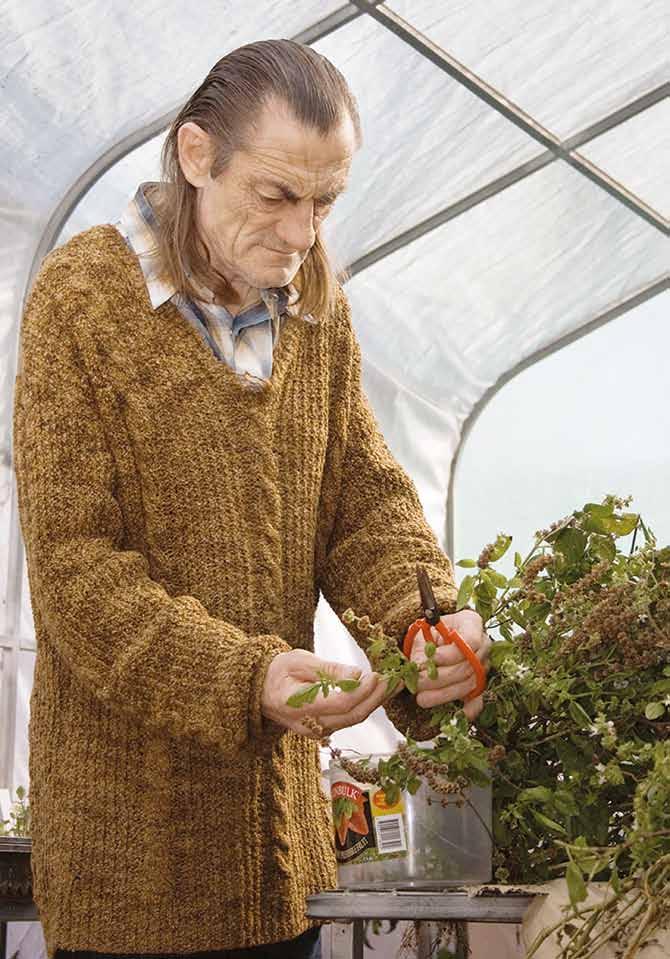



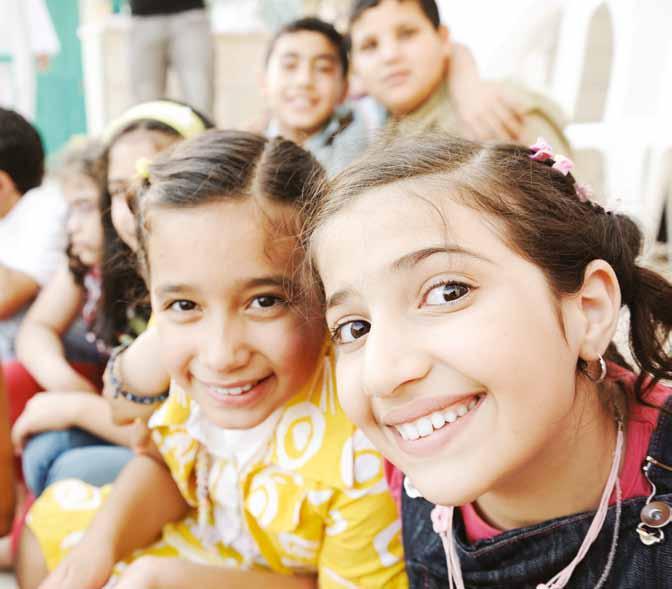
Each year, merri Community Health Services produces an annual Report and a Quality of Care Report to inform the community of our financial position and about the measures we are taking to ensure the services and programs we provide are of a high standard. this year we have combined the two reports to make this information more engaging and accessible. this report details how we have performed against a number of key performance indicators. i t also highlights areas of safety, governance and quality improvement measures and includes stories and quotes from our clients and staff. Over 35 staff, clients and carers were involved in the preparation of this report, helping to ensure its contents are informative and also relevant to our community.
this year’s report will be distributed to all new members and members who attend the annual General meeting in november 2011. i t will also be placed on our website, in the reception and communal areas at our service and program locations as well as being sent to local government offices and other health service providers in the local area.
Producing an annual Quality of Care Report is a requirement of the Victorian Department of Health and merri Community Health Services is committed to making it as valuable a reporting tool to the community as possible. We encourage you to tell us what you think of our report by completing the feedback form on page 43 so we can continue to improve how we communicate to you the quality and safety of our services.
Change has been a key feature of the last 12 months at merri Community Health Services. Several long serving board Directors, including Katerina angelopoulos (Chair), margaret Burdeu (finance audit and Risk management Committee Chair), tony Helou, milad El-Halabi and michael Caputo retired. We record our appreciation of their dedication to merri Community Health Services. Vince abelardo joined the finance Committee, Paul Geyer (Chair finance audit and Risk management Committee) was appointed to the board and Leo Santomartino, Johnny El-Halabi and marleine Raffoul (Chair Community Engagement Committee) were elected to the board. they joined Stephen Duns (Deputy Chair), Genevieve Juj (Chair Strategic Research Development and Evaluation Committee), and i on the board. We also welcomed community members Sanjay Gund, to our finance Committee, Robyn mcLachlan, to the Research Committee and also mustafa Kouklan to the Community Engagement Committee.
We farewelled our acting CEO Jacqui Wilson who did a great job and ensured a smooth transition for our new CEO. Our new CEO, nigel fidgeon has made an impressive difference in a short time as well as generating a positive response from staff to the changing culture of the service. He is pulling together a strong management team and developing key relationships with community partners, funding bodies and policy makers. Ensuring the ongoing quality of service delivery, while delivering on the extensive internal development sought by the board at a time of major health reform is no small task.
i would like to congratulate my colleagues on the board as well as the staff. We have worked hard together to ensure the good governance and leadership of this important community organisation. this has included refreshing the board charter and a series of governance training sessions led by Dr Heather Wellington and her colleagues.
i t has also included implementing several independent reviews dealing with complex and sensitive issues.
for example the board has acted on detailed recommendations to ensure the membership register is up to date, accurate and compliant with legal and company constitution requirements. We have been heartened by the support and cooperation of members through this process. the merri Community Health Services Board is confident the steps we have taken over the past year and the improved management systems and processes the CEO and his team are putting in place will help ensure the quality and responsiveness of the organisation to our community for considerable time to come. We have been especially grateful to Russell Kennedy Solicitors, middletons, the Vmia, Dr Paul Scown, SaCS Consulting, trevor Rowe Communications and the Department of Health, north and West metropolitan Regional Office, for their assistance through this period. On behalf of the board i would also like to thank mallesons Lawyers and Pitcher Partners accountants, company secretary Peter Corrigan and our board secretary Joan Wilkinson.
Meredith Carter, Chairperson
marleine Raffoul, Johnny El-Halabi, meredith Carter (Chair), Stephen Duns, Genevieve Juj, Peter Corrigan (Company Secretary), Leo Santomartino.
Absent: Paul Geyer, Vince aberlado

my first six months as Chief Executive Officer has been busy and challenging. the organisation is in an exciting phase of change with the largely new Executive team leading a range of innovations that will strengthen and position merri Community Health Services for a strong and successful future.
to ensure we continue to deliver high quality services to our community we have undertaken some key initiatives that have further strengthened us as an organisation. this has included maintaining our disability services accreditation status with positive accolades; centralising our corporate functions to our Harding Street site; undertaking a review of our Dental Service to better meet community needs and the changes associated with the new government funding model; and reviewing our information technology Service to enable us to proactively respond to current and future strategic issues and opportunities.
to ensure sound governance there has been a review of a range of corporate functions and reporting to the Board to ensure Directors receive the necessary information required to effectively govern the organisation. this has been challenging in relation to managing our data and reporting functions due to the variety of information systems we are required to administer in line with our funding requirements. Our review of it services and the implementation of a range of strategies that arose from this review will position us to more effectively meet these challenges as we move forward. We also finished this past year in a sound financial position.
Recognising the diversity and complexity of our services as a community health organisation, we rely on strong collaborative relationships with diverse groups and other service providers. i t is through these strong working relationships that merri delivers over 70 different services to the community across our sites. i’d like to thank all our partner organisations and supporters that either work with us or support us to ensure we can deliver our services.
the year ahead will be a busy year focussing on consolidating and strengthening our organisation to better meet the growing challenges facing us as a community health service
provider in an environment of national health reform. Key areas of focus will include advocating to our funders so we can continue to meet the growing demands on our services in delivering health services to our community; focussing on our facilities and clinical services planning to best respond to the identified needs of our community; and confirming the strength and commitment of our staff across the organisation as key to our ongoing success as we enact the findings from our staff climate survey to support change and ongoing improvement throughout the organisation.
i am fortunate to be leading merri Community Health Services and our team of dedicated staff at a time of change within our organisation and i would like to acknowledge and thank the staff, Board and the broader community for the support they have given me since joining the organisation.
Nigel Fidgeon, Chief Executive Officer
merri Community Health Services Limited is a not for profit organisation established to provide health, community and advocacy services and programs. as a Company Limited by Guarantee it has a board of 9 directors, a company secretary and a Chief Executive Officer.
Meredith Carter – Chairperson
Specialist Director appointed October 2009
master of Laws, Bachelor of arts, Certificate of Health Economics
a social policy consultant with a legal background and over 20 years experience employed at senior levels across the private, public and not for profit sectors
Has a reputation for effective advocacy, promoting law reform and community participation in policy development
Dr. Stephen Duns – Deputy Chair and member Strategic Research, Development and Evaluation Committee
Specialist Director appointed October 2009
Doctor of Business Leadership, master of Business administration, Bachelor of Letters (Psychology), Bachelor of arts (Philosophy), Diploma australian institute of Company Directors
Experience includes several Chief Executive Officer and general management roles in health and community services in australia and the uK. also extensive experience as a consultant in the not for profit and government sectors
He is currently also on the Boards of annecto, Save Sight institute and the australian Graduate School of Leadership, on the melbourne Hub Wisdom Council and a partner in Success Works, a consulting company advising on social justice
Vince Abelardo – Member of the Finance, Audit and Risk Management Committee
appointed by Directors January 2011
Bachelor of Economics, Bachelor of Business (marketing), master of Business administration
a Certified Practicing accountant (CPa) with executive, general management and board experience in the private and not for profit health care sectors
Johnny El-Halabi – Member of the Finance, Audit and Risk Management Committee
Elected Director november 2010 a resident of moreland for the past 20 years, involved in many political, recreational and sporting clubs in the municipality
Currently completing a degree in accounting
Paul Geyer – Chair of Finance, Audit and Risk Management Committee
Specialist Director appointed november 2010
Bachelor Science, master of Business administration
Diverse management experience in private companies and not for profit organisations working in the health, it and retail industries
Genevieve Juj – Chair of Strategic Research, Development and Evaluation Sub-Committee
Elected Director november 2010
Qualified in Human Service management, Social Policy and Social Work
Resident of the City of moreland and member of the merri Community Health Services Board of management since 2006
Currently employed as an executive at the Royal melbourne Hospital
Marleine Raffoul – Chair of Community Engagement Committee
Elected Director november 2010
Resident of the City of moreland and involved in various local committees
She has a teaching and business background and is a passionate advocate of health services to the multicultural community
Leonardo (Leo) Santomartino – Member of the Community Engagement Committee
Elected Director november 2010
Resident of the City of moreland for 45 years active community worker and involved with various community committees
Anthony Helou
Board member until July 2011
a long standing board member who has lived in the moreland area for 32 years. tony is a strong advocate of multiculturalism
Peter Corrigan – Company Secretary
appointed by the Board as Company Secretary 30 June 2009
» michael Caputo
» margaret Burdeu
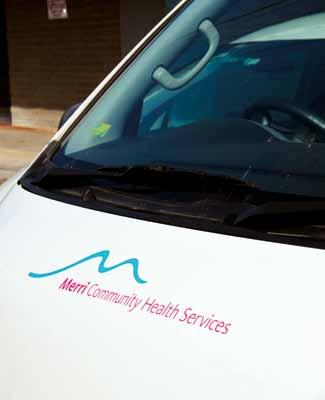
» Katerina angelopoulos
» milad El-Halabi
During the financial year 12 meetings of directors were held. Attendances by each director were as follows:
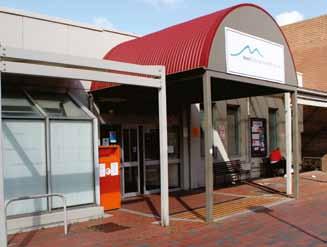
merri Community Health Services programs are primarily located within the City of moreland.
The City of Moreland is characterised by:
» a population of more than 152,000 people (one of melbourne’s most populous municipalities)
» an area covering almost 51 square kilometres
» a diverse cultural mix with over 32% of residents born overseas
» the top 10 countries of birth for residents being i taly, Greece, united Kingdom, Lebanon, China, india, new Zealand, turkey, malta and Vietnam
» an ageing population with over 19% of residents being over 60 years old
Some programs run by merri Community Health Services go beyond the boundaries of the City of moreland and these include:
» Case management Services which also covers the Hume region
» Some family services, including foundations, which outreach into the municipalities of Hume and Darebin
» Commonwealth Respite and Carelink Centre/CarerLinks north, Victims assistance and Counselling Program (VaCP) and Relationship and family therapy (Raft ) which service the communities in the northern metropolitan sub-region of melbourne (which includes the municipalities of Banyule, Darebin, Hume, moreland, nillumbik, Whittlesea and yarra)
these programs are many and varied, meeting specific, identified needs within the local community. Clients come to us because they have been referred by their doctor or another service provider, because a friend or family member has told them about us, or as a result of reading something about our services in the local paper or in our Bulletin.
merri Community Health Services has two divisions that deliver the range of health services provided by our organisation, Counselling, Youth and Family Services and also Clinical and Carer Services. in addition the Corporate Services division provides the full range of business and commercial services required to support delivery of our services to the community.
as at the 30th June 2011 merri Community Health Services staff totalled 296. many of these staff work part-time, the full time equivalent number of staff being 215.
Counselling, youth and family Services run programs from 8 different merri Community Health Services sites as well as offering a range of outreach services to clients in community settings.
» the Child Health Team which offers dietetics, speech pathology, occupational therapy, a paediatrician, psychologist and other services to assist with specialist assessment and intervention for children with developmental problems
» Foundations – Early childhood intervention for pre-school children with developmental delays and a Helping Children with autism program
» Home Interaction Program for Parents and Youngsters (HIPPY) – a home-based parenting and early childhood program which helps children make the best start possible at school when there are issues that may otherwise make this very difficult
» Victims Assistance and Counselling Program (VACP) to provide practical assistance and support for victims of violent crimes including access to specialised trauma counselling if this is required
» Family Services providing support and counselling to parents and their children, assisting them to deal with life and family challenges
» Integrated Family Violence Service which delivers counselling and group work programs to women and children who have or are experiencing family violence
» Generalist Counselling Services providing short to medium term support for those in the community experiencing issues such as grief or depression
» Duty providing a drop in counselling service at the Bell Street, Coburg site
» TRACKS providing a youth outreach program focusing on early intervention and education in drug and alcohol misuse in young people (16-25)
» Relationship and Family Therapy (RAFT) which provides counselling for families affected by drug or alcohol issues
» Exchange and CRISP – Communities Responding integration Support Program, activity based day programs including art, music and cooking
» Avalon, Linx and Intensive Home-Based Outreach Service (IHBOS), providing psychosocial support for people dealing with mental health issues
» Personal Help and Mentors Program providing support to people living in moreland whose mental health has a significant impact on their life but who don’t necessarily have a clinical diagnosis
» SAVVI – Supported Connections and Facility Cost Relief providing support to residents and proprietors of Supported Residential Services
» Dental Services are provided at the Brunswick site for community members with a Health Care or Pension Card
» Engagement with Aboriginal and Torres Strait Islander Communities increasing and strengthening the organisations partnerships with people and agencies to improve the health, wellbeing and access to health services of aboriginal and torres Strait islander people in our community
» Heart Foundation Walking which supports over 7 different walking groups within moreland
» Pedometer Loan Scheme at moreland Libraries. a joint project with the moreland City Council to encourage community members to better monitor their level of physical activity
» Moreland Food Access Project which aims to assist all community members to regularly access food that is healthy, affordable, culturally appropriate and safe, without needing to access emergency food relief programs
» Teeth Tales Research Project which is being conducted in partnership with the university of melbourne to improve the oral health of migrant communities
» Group Health Service for Schools and Community Groups offering primary and secondary school based education programs about physical and mental health, sexuality and relationships
» CoCare which provides human relations groups for young people with intellectual or learning disabilities
» School Focused Youth Service (SFYS) working with local schools and agencies to support at risk young people to continue their education, reducing risk factors associated with self harm, mental health issues and suicide
» Youth Counselling
» Y-GLAM – a performing arts project for same sex attracted and transgender young people between the ages of 14-25
Clinical and Carer Services run programs from 7 different merri Community Health Services sites. the following outlines some of the key services within the Division.
» a link to and information about a wide range of community, aged care and support services available locally. this includes services for older people, people with a disability and those who provide care and services
» Carers with options to take a break through short-term and emergency respite services, based on assessed need. they provide advice on and can coordinate access to respite services in a carer’s local area
» Services across the northern metropolitan region of melbourne which includes the municipalities of Banyule, Darebin, Hume, moreland, nillumbik, Whittlesea and yarra
» Respite services to support carers in their caring role with a focus on aged care, disability and mental health
» Over 25 different groups to assist with various community needs including social interaction and respite
» Groups and activities including art and craft, music and gardening. a specific i talian speakers group and a memory group for those experiencing dementia or memory loss
» Recreation and respite opportunities for children and young people with disabilities and their families
» Programs for eligible families within the north West region of melbourne
» Support to help the frail aged and people with complex disabilities to remain in their own homes and local community
» Services within the municipalities of both moreland and Hume
» Clinical services such as physiotherapy, podiatry, speech pathology, occupational therapy, dietetics, diabetes education and community nursing, to assist people to live independently at home
» Chronic disease management programs such as:
» Kids Life! – helping children with weight issues to become healthier, fitter and happier
» Life! Diabetes Prevention courses Early intervention in Chronic Disease – a support program for people newly diagnosed with a chronic health condition
» WorkHealth Checks – a WorkSafe Victoria program providing free health checks for workers at their place of employment
» a partnership between merri Community Health Services, Doutta Galla Community Health Service, melbourne General Practice network, Royal District nursing Service and melbourne Health
» Works to reduce the number of hospital admissions needed for clients with chronic medical conditions by providing them with appropriate community based health care. Emphasis is placed on chronic respiratory care, cardiac services and the diabetes community foot program
Corporate Services is based at Harding Street, Coburg and provides support to all staff of merri Community Health Services. Services provided include management of all financial aspects of the organisation, it support, quality and compliance and facilities management. Human resources also look after the training needs of the organisation, as well as sourcing and organising Home and Community Care (HaCC) training programs and publishing a HaCC training calendar for the City of moreland.
Our Hospital admission Risk Program (HaRP), Heartwise team, has received a Health Excellence award in the category of “Develop and Encourage Strategic Relationships”.
We were able to demonstrate the effectiveness and success of our service at reducing hospital admissions and improving client health outcomes and quality of life. the findings highlighted the ability of the Heartwise team to look after complex clients in the community, many of whom come from a culturally and linguistically diverse (CaLD) background. to win this award a number of aspects of our service were reviewed. these included:

» Our research in 2006 which was able to show a reduction in the number of times our clients had to be re-admitted to hospital – a reduction of 29% for all clients and 60% for our clients with Chronic Heart failure
» a statistical analysis in 2010 of the rehabilitation data of Heartwise clients 2004-2009. this showed significant physical benefit and quality of life improvement for these clients, the most benefit being gained by clients with the lowest initial scores
» a Beta Blocker Prescription audit performed in 2008/2009. Beta Blockers are a medication recommended for most people with Chronic Heart failure. Our audit indicated that 82% of clients were being prescribed a Beta Blocker by their doctor and those not prescribed had a documented medical rationale for this
» independent research indicating significant quality of life improvement reported by our HaRP clients
» 81% of clients surveyed reported being ‘very satisfied’ with HaRP care
» 52% reported their quality of life to be excellent after they became a HaRP client up from 29% before HaRP intervention
» 35% reported their quality of life to be poor before they became HaRP clients and this went down to only 6% after HaRP intervention
most clients enrolled in the Heartwise program have Chronic Heart failure and 88% have 3 or more significant medical issues, are frail and generally older (median age is 80.7 years). 69% are from a culturally and linguistically diverse (CaLD) background.

the first audit was completed in november and December 2010 to determine how long it took for clients to be entered into our Heartwise program following referral. this showed that the average delay for referrals was 10 days. When clients not immediately eligible to enter the program – usually because they were still waiting for tests – were taken out of this data, it showed the average delay for entry was 5.63 days. to enable us to improve on these results the process of handling referrals was reviewed and a procedure was put in place for monitoring clients who were waiting for tests.
a second audit was then conducted in mid 2011 to measure the results of the review. Data collated from January to June 2011 shows that the average delay is now down to 4.26 days. this reduces even further to 2.68 days for clients immediately eligible for entry into the program.
A quality audit was undertaken to help us to improve the way we receive referrals for our Heartwise program and to improve how quickly our staff can see people once they get home from hospital.
“all people have the right to make their own decisions, make choices and advocate for themselves”. this statement appears in the Disability Standards, Disability act 2006 and is embraced by the staff of merri Community Health Services. the taking Control Project was developed to assist clients to increase their confidence, make their own decisions and become their own advocate. Over time and with the support of their carer it is hoped that they will take more control of their life on a day to day basis.
five adults with disabilities were encouraged to participate in a workshop focused on interactive learning in a small group environment. they were invited to bring along a carer for the day, someone who could help them during the workshop and also assist them to use and maintain the skills they learnt. The aims of the workshop were:
» to give clients the opportunity to learn and build on their existing skills particularly in the areas of making decisions, choices and self-advocacy
» to give carers opportunities to learn and practice skills alongside the clients, so they could support them to transfer the skills from one situation to another
» to enable clients to take some control over their day to day lives
Paul was one of the workshop participants. He had mentioned to his carer and case manager that he’d been having trouble using his new Cabcharge cards with taxi drivers. He felt that some drivers were frustrated and cross with him because they didn’t know how to use the new cards. to assist Paul to deal with this situation he was given the opportunity to role play explaining the card to a taxi driver.
the skills Paul learnt in this workshop, including choice making and advocating, have given him the confidence
he needed so he could speak to taxi drivers. He now feels more empowered and has been able to transfer these skills to other areas of his life. He has since ordered more Cabcharge cards for himself and been more openly expressing his feelings with his case manager.

anne marie is Paul’s carer who attended the workshop with him. She says she has noticed positive changes in Paul and that, “Paul is now more confident, capable and empowered. He will speak up for himself, reminding taxi drivers how to use the cards”.
the taking Control Project team were very happy with the outcomes from the workshop. they have noted an increase in client confidence and participant’s ability to maintain and use the information and skills learnt. the workshop program was designed to encourage clients and carers to interact and learn in an informal, fun and supportive environment. this helped contribute to making the group cohesive and energetic and the role plays increased client confidence. the sharing of ideas resulted in some practical and sophisticated strategies for dealing with individual issues.

“All people have the right to make their own decisions, make choices and advocate for themselves.”
- Disability Act, 2006
as an active member of the northern metro and Hume Local indigenous networks (Lins) and both the moreland and Hume City Council indigenous Reference Groups, our merri Community Health Services Koorie Community Engagement Officer has been able to develop close working partnerships with many local community groups. Other member organisations of these groups include aboriginal Community Elders Services, Victorian aboriginal Child Care association, Ballerrt mooroop College, and Wandarra. Being an active member of these networks and groups has proven to be an effective way of connecting with communities and promoting the services merri Community Health has to
offer. this is turn has resulted in improved access to our health services by many of the aboriginal and torres Strait islander people in our community.
During the year we held a Koorie Carers Wellbeing Day at the minajalku Healing Centre in thornbury, the result of a partnership between the Victorian aboriginal Health Service family Counselling team and merri Community Health Services CarerLinks north mental Health Program. We were also able to bring together a group of community members to attend the naiDOC (national aboriginal and islander Day of Celebration) Ball a great celebration and networking opportunity.
Each year many refugees call the City of moreland their new home. Resettling in any new country can be difficult with the confusion of trying to understand a new culture, needing to learn a new language and not understanding the health care system. many refugees also need to deal with issues relating to families being torn apart in their escape from war and persecution. family members often end up in different parts of the world, afraid, alienated and alone. Once they arrive in australia they need to heal emotional and physical trauma from experiences in their homeland and sometimes refugee camps.
mulugeta abebe is merri Community Health Services newly arrived Community Engagement Officer. He helps newly arrived refugees and migrants in the City of moreland to better understand and access the range of health and welfare services available to them.
in addition to this role it is also important for merri Community Health Services to identify emerging health issues among newly arrived groups. to ensure the programs we offer are appropriate and effective mulugeta has also been able to provide the organisation with guidance and advice on relevant projects and initiatives such as teeth tales, a program designed to improve the oral health among newly arrived communities.
in may 2011 the australian federation of aiDS Organisations (afaO), merri Community Health Services and other community leaders representing a range of african and community organisations, hosted the australian national HiV and african Communities forum. the wide range of organisations involved ensured there was representation from women’s groups, youth, elders and religious leaders. the principal aim of the forum was to discuss how to improve the response to HiV among newly arrived communities in

australia and it provided an opportunity for participants to share information and to network. a report from the forum with recommendations for future directions is available by contacting the afaO Project Officer Jill Sergeant at jsergeant@afao.org.au
Left to Right: Osman Osman (national union of Eritrean youth and Students), Enaam Oudih (PEaCE multicultural Services Sa) and tuwe Kudekwashe (nZ aiDS foundation)
“It’s been great getting people involved in the services we offer, especially CarerLinks North and Children’s Services.Working for the community and Merri has been really rewarding and worthwhile.”
– Liz Phillips, Koorie Community Engagement OfficerDelegates at the Australian National HIV and African Communities Forum
“It’s definitely been about the personal relationships, and seeing those moments open up in people’s lives that has made it really, really worthwhile.” – Volunteer
“Well I mostly collect the eggs, spend time cleaning out and making sure they (the chickens) have water and it’s my responsibility to make sure they are healthy, making sure everything is good. I feel proud of it because I am doing something useful.” –
Hussein, Stewart Lodge Resident“It is so wonderful. It makes us happy with what we have done.” – Stewart
Lodge ResidentStewart Lodge is a Supported Residential Service in Brunswick and home for up to 80 residents, most of whom experience complex needs such as mental illness, physical or intellectual disability, acquired brain injury or drug or alcohol dependency. and for the past 3 years the Health Promotion team at merri Community Health Services has worked closely with residents to develop an edible garden on the premises.
With support and funding the residents, staff and volunteers have developed a substantial fruit and vegetable garden which includes permanent water tanks, a composting system, a worm farm and chickens.

Our evaluation of the initiatives at the lodge showed overwhelmingly positive results including:
» increased access to fresh vegetables for residents

» increased appreciation and excitement around food grown in the garden
» increased physical activity and participation in the garden by residents who previously hadn’t joined in social activities
» improved mental wellbeing and a sense of belonging or social inclusion for residents
» the creation of a sense of purpose, ownership, pride and responsibility for many residents
» Resident’s perception of the garden as a calm and relaxing space
the project is in its final year so the focus has been on sustainability. With 20-30 regular community volunteers currently participating in the project, the permanent employment of a part time project worker at the garden, ongoing participation from enthusiastic residents and growing community interest, the future of the garden appears sound and promising.
“It is so wonderful. It makes us happy with what we have done.”
- Stewart Lodge Resident
It is important to us that our clients are happy with the services we are able to provide.

in our most recent Client Satisfaction Survey the key strengths of merri Community Health Services were identified as:
» Being caring and supportive (75% of clients giving us a score of excellent)

» Being open and honest (73% of clients giving us a score of excellent)
Our clients also told us that:
» the service was easy to access (95%)
» We met their expectations (90%)
» they were satisfied with the service (98%)
Client Satisfaction Surveys enable our clients to give us confidential feedback so we can ensure our services are always appropriate and of a high quality. in our most recent survey, in early 2011, clients were asked questions about their view of our service, including the way we communicate with them, the service provided by reception staff, care provided, changes in their quality of life and their expectations and satisfaction levels.
646 clients completed the survey, either on the telephone (475) or by filling in a questionnaire (171), mailed or completed during group sessions. interviews were conducted in languages including: English, i talian, arabic and Greek. Areas which were identified as needing further improvement included:

» telling clients about other services (7% stated this was poor)
» Keeping clients informed as to how long things will take (6% stated this was poor)
» Referring clients to other services as appropriate (6% stated this was poor)
as shown in the graph to the right, scores had improved from the last survey conducted in late 2009.
in late 2010 the young Carers Program also conducted a Satisfaction Survey. this survey was completed by 22 clients and covered areas such as events, support groups, one-on-one support, funding/ financial assistance, information and overall satisfaction. 91% of the young carers indicated that they were ‘happy’ or ‘very happy’ with the program and would recommend it to other young people.
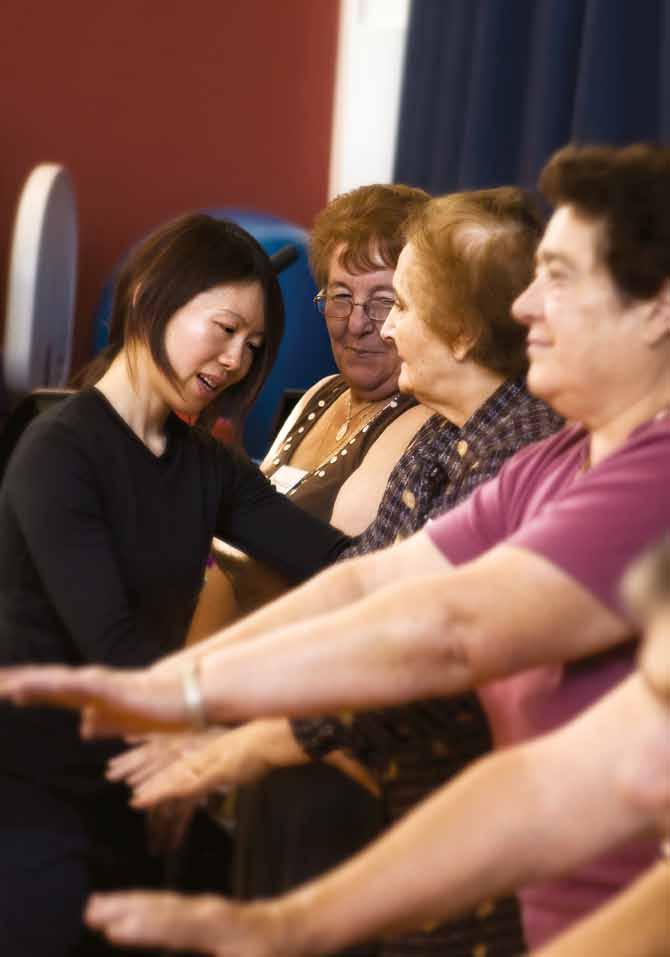
there are five new standards for consumer, carer and community participation that Victorian public health services now need to meet. indicators are used to measure and determine if the health service has met each standard. the chart below lists each of these standards and summaries the work undertaken by merri Community Health Services to achieve them.
information about our development of a participation strategy plan appears below this table
90% Client Satisfaction Survey feedback (see page 19) includes the following response:
95% ‘Respecting the client’s right to make decisions’
95% ‘Providing opportunities to ask questions’
a procedure was established to publish the date on all newly created documents. many documents were also edited to simplify the text.
We are currently reviewing the inclusion of a community member to our Governance committee and incorporating community feedback to our strategic plan. Refer to page 24 regarding the audit of disability services.
in December 2010 merri Community Health Services developed a Community Engagement Strategy with the assistance of the Health issues Centre (HiC). this strategy details methods and activities merri Community Health Services can undertake to further improve on its engagement with the community.
in april 2011 a Community Engagement Operational Plan (CEOP) was also written. i t was developed in consultation with staff and carers and covers the 18 months from July 2011 to December 2012. the plan acknowledges our current
community engagement practices and includes information from a survey undertaken in September 2009. nine specific projects are identified in this plan responding to the need for organisational development and capacity building which enhances community engagement.
the dental team is committed to continuously improve the quality of care provided to clients. Last year (financial year 2010/2011) we saw 2,908 clients for a total of 6,869 visits, so even a small improvement to our services can have a big impact on our community.
One of the ways we measure the quality of our care is by reviewing the number of times that someone who has received dental care needs to come back for a similar treatment. these are called ‘indicators’ and they are measured by all community dental practices in Victoria. We calculate the number of:
» fillings – when a filling needs to be redone within six months of initial work
» Repeat Emergency Care Visits – when clients need further emergency care within 28 days of receiving an initial emergency care appointment
» Returns after extraction – when clients need a further visit within seven days of a tooth being removed, for an ongoing problem

» fissure Sealants – when children need fissure sealants to be re-done within two years of original treatment. fissure sealants are layers of a plastic material placed over the grooves on the biting surfaces of children’s molar or back teeth, preventing decay in these grooves. the plastic layer should stay in place for several years
» X-rays – used for new clients receiving general dental care and to help us to diagnose dental problems
Our improved performance on these indicators has meant we have been able to treat a greater number of clients.
Graph 1 below shows that our dental clinic performed better than last year on all of the first four indicators.
It seems most people don’t like visiting the dentist. So we want to make sure that the clients that do come and see us are well looked after and receive the best care possible.
shortly afterwards to make sure any areas for improvement had been addressed. the audit template used was developed by Dental Health Services Victoria. as a result of the audit, we were able to develop a new sharps injury procedure for our staff in the unlikely event of them being injured with a sharp dental instrument. this is laminated and clearly displayed in the surgery.
the audit also ensured that all appropriate cleaning procedures in the surgeries and sterilisation room were being carried out as required and documented in a log book. this includes procedures such as flushing of dental water lines, weekly disinfection of dental chairs and weekly cleaning of autoclaves.
We are currently developing a clinic manual detailing specific procedures based on the australian Guidelines for the Prevention and Control of infection in Healthcare (nHmRC), australian Standard aS4185. Our manual will use the australian Dental association’s Standard Operating Procedures and it will be a practical guide for staff regarding how infection control principles are applied within the merri Community Health Services Dental Clinic. We will review this manual every 2 years or sooner if there are changes to aS4185 or the nHmRC guidelines.

all our dental therapists and dentists have completed their periodic training in infection control.
We also do an infection control audit each year to make sure our standards are maintained at the highest level possible. Our last audit was in may 2011 and a re-audit was completed
It is always great to hear you are doing a good job.
auditors assessing merri Community Health Services in may 2011 were impressed with the experience, knowledge, commitment and enthusiasm of our staff. i t was also excellent that they found staff always took individual cultural needs and expectations into consideration when they were planning and reviewing the services they were providing.
the purpose of this audit was to check the effectiveness of merri Community Health Services quality management systems against the Standards for Disability Services in Victoria, enabling us to maintain our certification in relation to the industry and Outcome Standards for Disability Services in Victoria.
Health and Disability auditing australia reviewed our documentation, assessed the implementation and delivery of services, talked to some of the people who use our services, their carers and also staff responsible for providing services. in total, 14 clients and carers assisted by giving feedback to the auditors for the review.
i t is important for all health care services to have a system for monitoring their service delivery and clinical work. the main focus is on safety and providing quality care and it is usually referred to as Clinical Governance.

in august 2010 merri Community Health Services finalised a work plan explaining how areas needing improvement are to be addressed. these improvements include putting a new process for recording and managing incidents into place, work in relation to community engagement, stricter arrangements for ensuring staff have the appropriate qualifications for their roles, a new training calendar for staff and a review of care planning processes.
Overall, the report stated that merri Community Health Services has established systems, processes and practices that promote service provision consistent with the standards. the report also stated that the organisation supports individuals to achieve their personal outcomes consistent with the standards.
there were some areas for improvement that were identified and the organisation was able to put these recommendations into place within one month of the audit. the improvements were in relation to the consolidation of electronic and hard copy client files, the development of a form to document a client’s choice of support person/advocate and specifying timeframes for responding to suspected cases of abuse and neglect.
We value client feedback, including complaints, as it helps us to improve the service we provide.
in most cases the improvements we make relate specifically to the individual who made the complaint, but we also look for ways in which we can use this information to improve services for other clients too. as outlined in the graph to the right between July 2010 and June 2011 we received feedback from 46 clients, 60% being expressions of thanks from clients.


merri Community Health Services mental health team workers have found an innovative way to engage SRS residents and consequently give them more support and assistance.
they have been working with local library staff to bring facilitated story-telling to residents.
the program they have developed is called Bookwell and it was first piloted in a partnership between merri Community Health Services, Brunswick Library and Brunswick Lodge, a Supported Residential Service. Based on a successful English initiative, participants first listen to a story and are then invited to discuss the story they have heard, relating it to their memories or life experiences.
Bookwell has given mental health workers the opportunity of hearing, often for the first time, the life stories of residents in the groups. One resident who started to regularly attend these sessions had previously isolated himself from others and had
been resistant to receiving help from our staff. as a participant of the Bookwell program he started to share stories of his past and talk about his previous dreams. He even brought in photos of his earlier life. as our staff started to understand more about him they were able to work more effectively with him and provide further assistance.
Hearing the life stories shared in the Bookwell program has allowed merri Community Health Services staff to learn more about the participants, often gaining an insight into how to work differently and more successfully with them. in addition, through sharing stories participants have often been able to better understand their own life experiences and develop better social networks.
Due to the success of the program it has now been expanded to include Edwards Lodge and Reservoir Gardens through a partnership with Darebin Library.

Occupational therapists from north West area mental Health Service (nWamH) have joined the Exchange and Communities
Responding integration Support Programs (CRiSP) Day Programs to run both the Healthy Cooking and Eating Group and the fitness Group. these groups are run to improve the mental health of participants, encouraging them to focus on their diet and physical fitness.
the fitness program, run in partnership with the ymCa, provides participants with access to a personal trainer to help them to achieve their fitness goals. the healthy eating and cooking group teaches food preparation skills and encourages participants to consider healthy food options.
Establishing this inter-service partnership has created opportunities for merri Community Health Services staff and staff from nWamH community mental health to work more closely together. access to our services has improved, with a number of clients not previously in contact with our day programs now enjoying the services we have available. this integration of our services and programs is an important aspect of merri Community Health Services as we strive to continually improve client outcomes.
Lucy hadn’t worked for 15 years when she started the Health Optimisation Program for Employment (HOPE). She had previously been working in a management level job but after suffering a breakdown she lost confidence and was unable to get back to work. at the end of the 10 session program Lucy commented on her increased confidence. She has now learnt skills to help her find employment and remain healthy.
HOPE is a program resulting from a partnership between SOfa (Social firms australia), framework for Health (St Vincent’s Health) and Job Services australia. i t aims to assist people with mental health issues to manage their symptoms and maintain their health whilst in and seeking employment. merri Community Health Services is one of a number of organisations in the state who were invited to assist in delivering the program by providing support to facilitators.
the facilitator of each program is a peer who has been in the same or similar situation. Working with someone who has experienced similar issues adds an extra level of understanding and support for the participants.
HOPE aims to help those doing the program to better understand their own optimal levels of health and how they can work to maintain this. the rate of employment for HOPE participants in Victoria has risen from an initial 10.3% to 26.1% and has also been shown to contribute to reducing hospital admissions for those involved in the program.
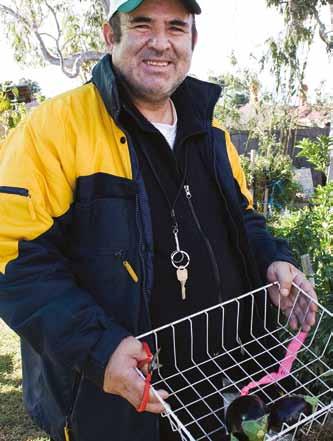
the CRiSP (Communities Responding integration Support Program) Day to Day Living program has recently entered into partnership with minD australia and Voices Victoria to co-run a Hearing Voices Group. the program was designed by a network of professionals, carers and voice hearers. i t aims to reduce the distress associated with hearing voices and to help group members to understand the experience, exploring new ways of coping and living.
as one participant said, “the group offers me a chance to learn coping strategies from others”. i t does this as it provides a safe space for people who hear voices to explore the experience without judgement or fear.
It can be very isolating to have a condition that family and friends just don’t understand. This can be especially true for people who experience hearing voices.
“It’s good to be able to share your experiences with others who experience similar issues.”
- Hearing Voices Group Member
When malcolm came out of hospital a year and a half ago, he said, “i didn’t think i was going to live”. He was struggling with shortness of breath which made many day to day activities difficult and meant he regularly needed to use an oxygen tank.
malcolm’s HaRP (Hospital admission Risk Program) Care facilitator linked him into the melbourne Easy Breathers program which supports people to manage their respiratory disease and aims to reduce the number of times they need to go to hospital. His breathing has now improved to the extent that he no longer even needs to attend this program.
malcolm also joined the Heartwise program, which assists people with chronic heart failure. He says the exercises “have really kept me going” and “improved my way of life”. in addition he has found the process of being linked to
various services and programs has been easy, stating, “i t’s handy, they’ve got everything together over there. all you have to do is make an appointment”.
new staff to the Hospital admissions Risk Program (HaRP) commented that the orientation program when they started could be confusing and that they lacked information about the other services in the program. this led in December 2010 to staff revising the Orientation manual.
the HaRP program is a service for people with chronic and complex medical conditions who frequently present or are at risk of presenting to hospital and require intensive service coordination. this program represents a partnership between
Doutta Galla Community Health Service, melbourne General Practice network, Royal District nursing Service, Royal melbourne Hospital and merri Community Health Services.
HaRP staff examined the policies, procedures and orientation documents across the organisations involved and consolidated all relevant orientation information into one document, including a checklist. the three staff that have since completed an orientation with this new manual all stated they were ‘highly satisfied’ with it.
Care plans are particularly important for clients with chronic and complex care conditions.
this is because they have multiple needs and issues that often impact on each other. Care plans are a written document that records the client’s goals and identifies ways to reach those goals. these goals are worked out with the client and where possible their carer and/or family. By recording goals in this way clients often better understand the steps needed along the way and are more motivated.
the Heartwise and melbourne Easy Breathers programs have set within their guidelines the target of 80% of clients having a care plan. Currently the programs are exceeding this target with 90% of Heartwise clients and 84% of melbourne Easy Breathers clients having a care plan documented in their file. to make these results even better we are currently improving our data integrity through an education program.
“It’s handy, they’ve got everything together over there. All you have to do is make an appointment.”
- Malcolm
Occupational Therapists at Merri Community Health Services help people who are aged or disabled achieve independence in their daily lives.
this includes assisting them to complete tasks such as bathing, dressing, eating and accessing the community. We also help to make a clients home safer if they are no longer able to use steps to access their home or if they have had a fall.
During home visits clients are asked to identify the areas they want to improve or require assistance with and together with the occupational therapist a plan of action is developed. We work with the client to determine the most important goal and the steps to achieving that goal.
an important part of helping clients to improve independence and safety is looking at the level of difficulty that is involved in each task. Our staff can then prescribe equipment, modifications or techniques that reduce this degree of difficulty allowing our client to gain confidence and complete the task independently.
to help us determine whether or not our client’s are achieving their goals and whether changes have made a difference,
we measure outcomes. this means we compare client reports on the initial degree of difficulty of a task with the difficulty level they report after equipment/modifications are completed.
the occupational therapy team analysed their outcome measures for the 2010 year, reviewing 251 clients. i t was found that 129 clients had extreme difficulty with a particular task at assessment but only 5 were still having extreme difficulty after assistive equipment or modifications were completed. for these 5 clients we looked at the problem again to come up with an alternate solution.
measuring the changes we make in our clients’ lives means that we know that what we do really is making a difference. as we age, a common fear is the loss of independence and sometimes a simple change in the way a task is done can make all the difference.
Some people are more at risk than others and they are usually a complication for people who spend a lot of time in a wheelchair or are confined to bed. Others at risk include people who have a disability and sit for a long period of time without moving.

the good news is they are also largely preventable. People who have a pressure ulcer or who are at risk of a pressure ulcer require a quick and appropriate response. an Occupational therapists role is to provide advice on equipment to help prevent and/or manage the ulcer, working together with other health professionals including nurses, dieticians, physiotherapists and podiatrists.
the number of referrals to Occupational therapists at merri Community Health Services for people who either have or are at risk of developing pressure ulcers, has been increasing. to ensure we can respond in a timely way to these referrals we now have an Occupational therapist employed specifically in this area. this has allowed us to develop evidence based best practice for our clients and make appropriate referrals and linkages with other services as required.
merri Community Health Services has also been instrumental in developing a special interest group for Occupational therapists working in the area of pressure care. the group meets three times a year to develop skills and knowledge and expand on evidence based approaches. the interest group is currently in the process of developing a set of practice guidelines for Victorian Occupational therapists in the area of pressure ulcer prevention and management.
Pressure ulcers (sores) are not only very painful they can also reduce how well you are able to go about every day activities and require significant treatment if they become infected.

With the support of the merri Community Health Services Volunteer Coordinator, volunteers who would lead the classes were able to access training through an arthritis foundation training program. following liaison with the local pool our first Peer Led Exercise class started. the response has been terrific with one client telling us, “i t’s encouraged me to be healthier, i’ve lost 8 kilos. i’m so grateful i can continue with the Peer Led group as it’s friendly, affordable and suits my needs.”
Our physiotherapists encourage participation in physical activities to prevent and self manage health conditions. Some of the benefits of hydrotherapy were reported to us in our client survey.
Comments included:
» “By coming to floor exercise groups and hydrotherapy I noted a huge difference in pain, mobility and I’m sleeping so much better. It made me forget my pains.”
» “Fun and nice in the water, helped my problem.”
» “Helped with my back and knee pains.”
Our clients who were doing group exercises in the pool, hydrotherapy, were giving us really positive feedback. But when we did a survey of 52 clients who had finished the group program we found that only 3 of the 21 previous participants who responded had kept up with water exercise classes.
i t was this information that led us to develop a Peer Led Water Exercise class.
» “It’s gentle exercise, relaxing my muscles, it helps me with walking and my knee and my back, it strengthens my muscles.”
» “I do like to exercise in the hot pool because it gives me relief for my back and neck, and also gives me a chance to meet other people.”
In partnership with the University of Melbourne and Austin Health, Merri Community Health Services has embarked on an observational study on the effect of Feldenkrais lessons on people with osteoarthritis.
the feldenkrais method® involves exercise classes where clients explore movement, posture and breathing. a practitioner guides the clients through a planned sequence of movements. through observation clients can then learn easier ways of moving when doing everyday activities. Studies have shown that practicing feldenkrais can improve balance and reduce pain. this study hopes to demonstrate that it can also improve the way that osteoarthritis sufferers walk (gait), improve their range of movements and reduce their pain.
twenty-two people were recruited to take part in the study, which runs for twelve months. their gait was assessed before the lessons commenced in may 2011 and will be assessed again after the program finishes in December 2011.
i t is hoped that this project will help merri Community Health Services osteoarthritis clients improve their quality and ease of motion and movement, their coordination and their sense of balance, control and comfort. i t is also hoped that it will help reduce pain and prevent further deterioration due to their condition.
“Clients improve their quality and ease of motion and movement, their coordination and sense of balance.”

Hoarding affects between 3-5% of the population and is a long term chronic condition which increases in severity with age. Hoarding can lead to family breakdown, financial issues and physical health issues. Statistics also show that people aged 50 years and over living in hoarding households are the highest fire risk group and they accounted for 24% of all preventable fire fatalities between 1999 and 2009. the PHams team decided to hold two community sessions to gauge the impact of this illness in the moreland community. We approached the editor of the local Leader newspaper who was happy to assist us in promoting the information sessions and a journalist wrote a significant full page article on the problem after interviewing our staff.
a local woman in her 40’s had collected so many newspapers that gaining access to her home was now quite difficult and she could no longer use most of her living spaces. this also meant that the risk of there being an uncontrollable fire became quite high. When this lady was referred to our Personal Helpers and mentors program (PHams) it was our first experience of working with people with hoarding behaviours.
People with hoarding behaviours and their concerned families came to our information sessions and shared their struggles. this has meant that PHams and our Carer Services can now work with them to provide support and work towards reducing the impact of this illness on their lives.
PHams are also involved in a Hoarding action group with the Department of Human Services. together we are planning a forum on hoarding for organisations in the north West region of melbourne. the forum will support workers to improve services available to people with hoarding behaviours.
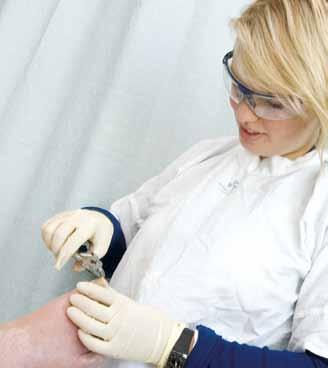
these were the statistics for the merri Community Health Services Podiatry Clinic during the month of October 2010. they come from a project undertaken to determine why clients missed or cancelled their appointments and how often this was happening.
Clients who cancelled an appointment, were more than 15 minutes late, or who did not turn up at all, were contacted to determine the reasons for not attending or cancelling. a total of 82 appointments out of 655 for the month, were considered a no show or a cancellation.
‘forgetting’ was the most frequent reason clients did not attend their appointment. for approximately 50% of those who had forgotten being ill at the time was a contributing factor.
using this data the podiatry team put together a plan to assist their clients to remember their appointments and to reduce missed and cancelled appointments. the reception team leader organised a six month trial commencing in July 2011 for all podiatry site receptions to SmS or telephone clients the day before their appointment time. at the end of the trial an evaluation will be done to see if there is a reduction in missed appointments.
When 57 clients don’t turn up for their appointment in a month and 25 clients cancel their appointment in the same month, this impacts on a clinics effectiveness and efficiency.
i t can be pretty difficult for a young person when they have a parent, brother, sister or another family member with a special need, disability, drug, alcohol or mental health issue. But the Give me 5 young carers and teens sibling program gives them a break.
Give me 5 meets monthly and provides participants with fun and supportive group activities as they improve their self-esteem and develop in their caring roles. Being with other young carers enables them to normalise their experiences as they build connections, learn coping strategies and enjoy craft, team games, challenges and an evening meal.
» “I get great friendship and lots of help”
» “I feel better seeing the guys, getting flocked by them before I walk in the door”
Over the past year the program has been able to maintain a good participation rate with 76% of participants staying involved beyond a year and just over half (54%) attending the program for more than two years. this year 9 new participants joined the program. most of those in the program (46%) are between 15-16 years old and 35% of participants have a cultural and linguistically diverse background.
» more than 80% of participants reported improved activities with friends and improved changes in understanding of their role

» more than 60% reported improvements in coping with their situation
» Over 80% reported an improvement in their relationship with the family member who has the disability or special need

» many (43%) also reported increased participation with their wider community, such as school, sports and other groups
Give me 5 is a program brokered by the Commonwealth Respite and Carelink Centre/CarerLinks north’s young Carer program and delivered by the timE Out Sibling Program at melbourne Citymission.
“Information on what other people do has helped me.”

Physical and sexual abuse, depression, anxiety, stress, the need for a local youth health clinic and a lack of affordable health and fitness programs; all are issues identified in an online survey of 105 young people and 60 teachers and workers in the City of moreland, undertaken by the youth Health team in 2010.
the aim of the survey was to explore the main health and wellbeing issues for youth in our local area. the information gathered has provided us with a greater knowledge and understanding of their needs which ensures that the services and program we develop are relevant and appropriate.
Data collected was presented at a youth Health forum in march 2011 where young people, teachers and workers were invited to discuss ways to collaboratively address these emerging issues.
Helping school students explore the link between drugs, alcohol and criminal behaviour

What does an assault at a train station, hoon behaviour and an armed robbery all have in common? They are all scenarios decided on by students at Brunswick Secondary School for use in a new DVD called Think Twice.
think twice is being developed as a resource for use with year 10 -12 students across Victoria. i t aims to help young people to think about the consequences of their actions and particularly addresses the link between drug and alcohol use and criminal behaviour.
the merri Community Health Services youth outreach team, tRaCKS, have been working on the project with the Victoria Police in conjunction with the students. this has ensured that it is a relevant and accurate resource that can be used by youth Resource Officers within schools or by our tRaCKS team when they deliver school programs.
included within the DVD are interviews with Roger attouche, a reformed offender now manager of the Second Step Program and Judge mcPhearson from the melbourne Children’s Court. funding has been provided by School focused youth Services and the project has the support and involvement of Docklands apartments, Rmit film students, the Police academy and Erin Dolan and associates – Private Psychologist services.
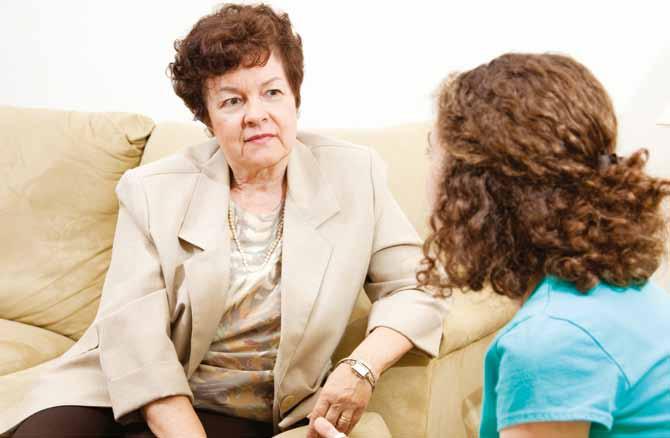
Over the last few years the number of clients requiring specialist counselling services from the Victims Assistance and Counselling Program (VACP) has increased.
i t is important to us that we look after everyone in the community who needs our assistance. to help us to do this the contract we signed with the Department of Justice in 2009 included a more flexible funding arrangement for the provision of counselling services. this has meant that merri Community Health Services has been able to refer more clients to specialist private counsellors.
With our clients seeing specialist private counsellors it is important to evaluate the usefulness of this service, from both the client and counsellor perspective.
after receiving client consent, private counsellors are required to send merri Community Health Services an Outcome Report. to enable us to evaluate the services being provided we reviewed 119 of these reports and interviewed 20 clients who had received outsourced counselling.
Data collected was analysed to determine how much change had occurred for our clients, their level of satisfaction with the processes involved and where further improvements could be made to ensure better client and service outcomes.
Our results indicated some areas of significant benefit to our clients. they also reinforced the importance of feedback mechanisms and some of the areas where further improvements could be made.
following our evaluation the VaCP has improved the administrative processes required for the program. Changes made include inviting all adults receiving counselling to provide us with feedback. this feedback is then linked to the counsellor who provided the service so VaCP workers are able to make better and more informed referrals. Counsellors have also been provided with a client consent form which explains their Outcome Report to the client and an electronic Outcome Report template to ensure better consistency of feedback.
anthony Jones, team leader of VaCP states, “Overall this has been a very worthwhile project. We have had good outcomes for both our clients and our service. the evaluation has also helped us to fine tune and further improve our processes”.
Strong friendships and connections have been made between the participants of a choir being run by the activity Programs team.
Established as a result of Well for Life funding from the Victorian Department of Health (2009/2010), the choir is for older frail people living in the City of moreland and surrounding areas.

the choir participants have responded very enthusiastically to the passion and skills of the music therapist who helped establish the program. they enjoy practicing favourite tunes,
learning new songs from different cultures and planning for concerts to entertain local groups and other activity program groups. the concerts generate significant excitement and require considerable preparation. Special outfits are worn and lots of singing practice takes place.
the choir members play an active role in all aspects of the choir and staff members utilise the skills and interests of each participant to ensure the choir continues as a successful and growing program.
a recent review of the Child Health team has given us the opportunity to reflect on how our team functions and the quality of the service we provide.
including both internal and external stakeholder feedback the review, by an independent consultant, looked at all aspects of the team including the speech pathology, occupational therapy, audiology and paediatric services we provide.
the review was very positive and highlighted the work the team has done in building partnerships with other organisations, our focus on family centred practice, multidisciplinary care and service coordination. i t also noted the challenges an organisation such as ours has with a growing number of families coming to us with multiple issues that need to be addressed, all impacting on the health of their children.
as a result of the review a team plan has been developed.
Key recommendations being implemented include:
» the creation of a policies and procedures manual. this will guide standard practices and enable consistent data capture for the purpose of team planning functions
» additional resourcing and training to support the “welfare” aspect of the current workload
» Prioritising of the further development of external and internal partnerships
We believe these changes will assist us to continue to provide high standards of care and make ongoing improvements to our service.
Each year merri Community Health Service participates in a state-wide survey which reviews how our organisation rates against guidelines for best practice.
the survey looks at areas such as a client’s first contact with the service, our ability to identify a client’s health care needs, creating health care plans and making client referrals to other care providers.
Staff are required to rate themselves on 11 questions relating to Service Coordination and 7 questions relating to integrated Chronic Disease management. Service Coordination aims to link people to the right services at the right time. this makes it easier for clients to find the service they need without having to make multiple telephone calls or filling in a number of forms. integrated Chronic Disease management provides coordinated care for clients with chronic health conditions.
the main area of improvement for the organisation has been in the use of a common assessment tool. this tool was developed last year by a group of staff within the allied Health team and has been in use with clients since July 2011. i t promotes consistency in the assessment of clients and in developing care plans.
merri Community Health Services scored well in the area of service coordination documentation which includes policies, procedures, feedback processes and templates.
Entry to most of our services is organised by the information and access team. unfortunately, this team has been understaffed at times within the last 12 months which has meant there have been some delays responding to and assessing new clients. merri Community Health Services addressed this issue by employing locum staff to assist the team.

the following pages form the Concise financial Report for merri Community Health Services Ltd and are extracted from the audited financial Report. all reports and specific disclosures included have been derived from the audited financial Report. the Concise financial Report cannot be expected to display a full understanding of the financial performance, financial position and financing and investing activities of merri Community Health Services Ltd. a full copy of the financial report is available at www.mchs.org.au

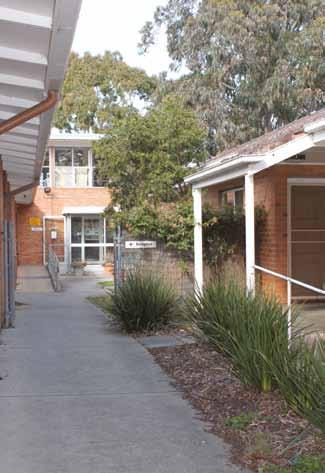
in prior years the entity had failed to follow accepted end of year procedures in recognising unearned income as a liability in its Statement of financial Position. this has been corrected in the year ending 30 June 2011 with calculations made to
reflect the correct comparative figures for 2010 which are shown in the 2011 accounts. Long Service Leave provisions had also been understated.
Details of the corrections are shown below.
www.mchs.org.au
Information and Access
Phone: (03) 9388 9933
Email: serviceaccess@mchs.org.au
Brunswick
11 Glenlyon Road
Brunswick ViC 3056
Phone: (03) 9387 6711
Coburg
93 Bell Street
Coburg ViC 3058
Phone: (03) 9350 4000
Fawkner
79 Jukes Road
fawkner
ViC 3060
Phone: (03) 9357 2444
Glenroy
5D Cromwell Street
Glenroy
ViC 3046
Phone: (03) 9304 9200
1st floor, 368 Sydney Road (Entrance via Harding Street)
Coburg
ViC 3058
Phone: (03) 8319 7400
Broadmeadows
56 Dimboola Road
Broadmeadows
ViC 3047
Phone: (03) 9302 1780
Brunswick West Activity Programs
382-386 moreland Road
Brunswick West
ViC 3055
Phone: (03) 9386 3575
Vic Place, Coburg
21 Victoria Street
Coburg
ViC 3058
Phone: (03) 9355 9900
Interchange North West, Pascoe Vale
Shop 9E anderson Street
Pascoe Vale
ViC 3044
Phone: (03) 9350 4600
Chifley Drive, Preston
Level 2, 110 Chifley Drive
Preston ViC 3072
Phone: (03) 9495 2500
Commonwealth Respite and CareLink Centre
Phone: 1800 052 222
Emai: clnintakeworkers@mchs.org.au
Thornbury
298 Victoria Street
thornbury ViC 3073
Phone: (03) 9484 5314
Your opinion is important to us
Please tell us what you like about this report and how we can improve next years. you can send your comments to the quality officer by mail to: Level 1, 368 Sydney Road, Coburg 3058, or email to: mchs@mchs.org.au

How would you rate the report overall? (Please circle)
What did you think about the report? (Please comment)
How could we improve the Quality of Care Report next year?